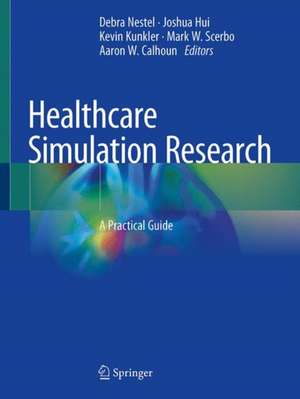Healthcare Simulation Research: A Practical Guide
Editat de Debra Nestel, Joshua Hui, Kevin Kunkler, Mark W. Scerbo, Aaron W. Calhounen Limba Engleză Paperback – 25 noi 2019
Healthcare Simulation Research: A Practical Guide is an indispensable reference for scholars, medical professionals and anyone interested in undertaking HSR.
Preț: 807.14 lei
Preț vechi: 1008.91 lei
-20% Nou
Puncte Express: 1211
Preț estimativ în valută:
154.44€ • 161.69$ • 127.79£
154.44€ • 161.69$ • 127.79£
Carte tipărită la comandă
Livrare economică 01-07 aprilie
Preluare comenzi: 021 569.72.76
Specificații
ISBN-13: 9783030268367
ISBN-10: 3030268365
Pagini: 368
Ilustrații: XVII, 368 p. 43 illus., 25 illus. in color.
Dimensiuni: 210 x 279 mm
Greutate: 1.35 kg
Ediția:1st ed. 2019
Editura: Springer International Publishing
Colecția Springer
Locul publicării:Cham, Switzerland
ISBN-10: 3030268365
Pagini: 368
Ilustrații: XVII, 368 p. 43 illus., 25 illus. in color.
Dimensiuni: 210 x 279 mm
Greutate: 1.35 kg
Ediția:1st ed. 2019
Editura: Springer International Publishing
Colecția Springer
Locul publicării:Cham, Switzerland
Cuprins
Section I. Introduction to Healthcare Simulation Research .- Ch 1: Developing expertise in healthcare simulation research.- Ch 2: A contemporary history of healthcare simulation research.- Ch 3: Programs of research in healthcare simulation.- Ch 4: Starting your research project: from problem to theory to question.- Ch 5: Overview of serious gaming and virtual reality.- Ch 6: Overview of computational modeling and simulation.- Section II. Finding and Making Use of Existing Literature.- Ch 7: Seeking, reviewing and reporting on healthcare simulation research.- Ch 8: Systematic and nonsystematic reviews: choosing an approach.- Section III. Qualitative Approaches in Healthcare Simulation Research.- Ch 9: Introduction to qualitative research in healthcare simulation.- Ch 10: Key concepts in qualitative research design.- Ch 11: Refining your qualitative approach in healthcare simulation research.- Ch 12: In-depth interviews.- Ch 13: Focus groups in healthcare simulation research.- Ch 14: Observational methods in simulation research .- Ch 15: Visual methods in simulation-based research.- Ch 16: Survey and other textual data.- Ch 17: Transcription and data management.- Ch 18: Grounded theory methodology: key principles.- Ch 19: Analyzing data: approaches to thematic analysis.- Ch 20: Naturally occurring data: conversation, discourse, and hermeneutic analysis.- Section IV. Quantitative Approaches in Healthcare Simulation Research.- Ch 21: Quantitative research in healthcare simulation - an introduction and discussion of common pitfalls.- Ch 22: Research and hypothesis testing - moving from theory to experiment.- Ch 23: Designing quantitative research studies.- Ch 24: Outcome measures and data.- Ch 25: Designing, choosing, and using assessment tools in healthcare simulation research.- Ch 26: Reliability and validity.- Ch 27: Statistical analysis: getting to insight through collaboration and critical thinking.- Ch 28: Nonparametric tests used in simulation research.- Ch 29: Contemporary analysis of simulation-based research data: P values, statistical power, and effect size.- Ch 30: Advanced statistical analyses.- Section V. Mixed Methods and Data Integration.- Ch 31: Applying mixed methods research to healthcare simulation.- Ch 32: Making use of diverse data sources in healthcare simulation research.- Section VI. Professional Practices in Healthcare Simulation Research.- Ch 33: Writing a research proposal for sponsorship or funding.- Ch 34: Writing an ethics application.- 35: Strategies in developing a simulation research proposal.- Ch 36: Identifying and applying for funding.- Ch 37: Anatomy of a successful grant proposal.- Ch 38: Establishing and maintaining multicenter studies in healthcare simulation research.- Ch 39: Supervision in healthcare simulation research: creating rich experiences.- Ch 40: Project management in healthcare simulation research.- Ch 41: Disseminating healthcare simulation research.- Ch 42: Writing for publication.- Ch 43: Peer review for publications: a guide for reviewers .- Section VII. Getting Started in Healthcare Simulation Research: Tips and Case Studies .- Ch 44: Unpacking the social dimensions of research - how to get started in healthcare simulation research.- Ch 45: Case Study 1: Joining the research conversation: the romance and reality.- Ch 46: Case Study 2: Discovering qualitative research.- Ch 47: Case Study 3: Application of quantitative methodology.- Ch 48: Case Study 4: Navigating the peer review process in healthcare simulation: a doctoral student's perspective.
Notă biografică
Debra Nestel, PhD FSSH
Professor
Monash Institute for Health & Clinical Education, Monash University
Department of Surgery, University of Melbourne
Victoria
Australia
Joshua Hui, MD, MS, MHA
Associate Physician
Kaiser Permanente Los Angeles Medical Center
Emergency Department
Los Angeles, CA
USA
Kevin Kunkler, MD
Professor
Texas Christian Univ. and Univ. of North Texas Health Science Center School of Medicine
Department of Educational Affairs
Fort Worth, TX
USA
Mark W. Scerbo, PhD, FSSH, FHFES
Professor
Department of Psychology
Old DominionUniversity
Norfolk, VA
USA
Aaron W. Calhoun, MD, FAAP, FSSH
Professor
Department of Pediatrics, University of Louisville School of Medicine and Norton Children’s Hospital
Louisville, KY
USA
Textul de pe ultima copertă
This book provides readers with a detailed orientation to healthcare simulation research, aiming to provide descriptive and illustrative accounts of healthcare simulation research (HSR). Written by leaders in the field, chapter discussions draw on the experiences of the editors and their international network of research colleagues. This seven-section practical guide begins with an introduction to the field by relaying the key components of HSR. Sections two, three, four, and five then cover various topics relating to research literature, methods for data integration, and qualitative and quantitative approaches. Finally, the book closes with discussions of professional practices in HSR, as well as helpful tips and case studies.
Healthcare Simulation Research: A Practical Guide is an indispensable reference for scholars, medical professionals and anyone interested in undertaking HSR.
Caracteristici
Provides descriptive and illustrative accounts of healthcare simulation research (HSR) Offers an introduction to HSR, qualitative, quantitative and mixed methods approaches to HSR, and professional practices in HSR Written for anyone interested in undertaking HSR
